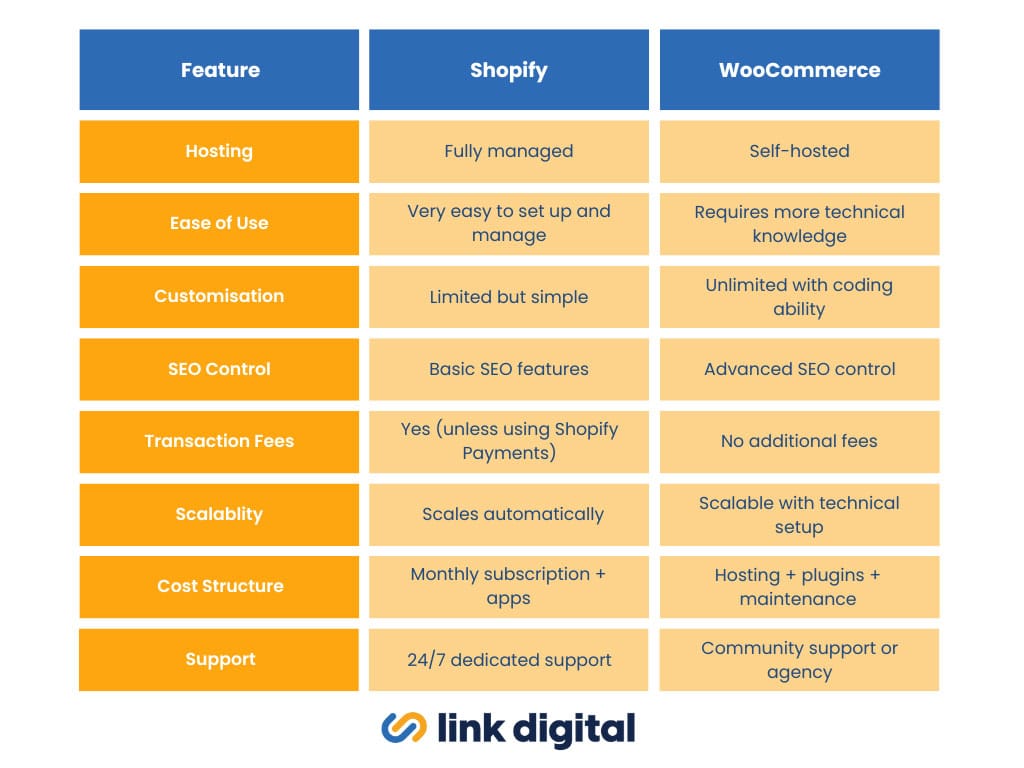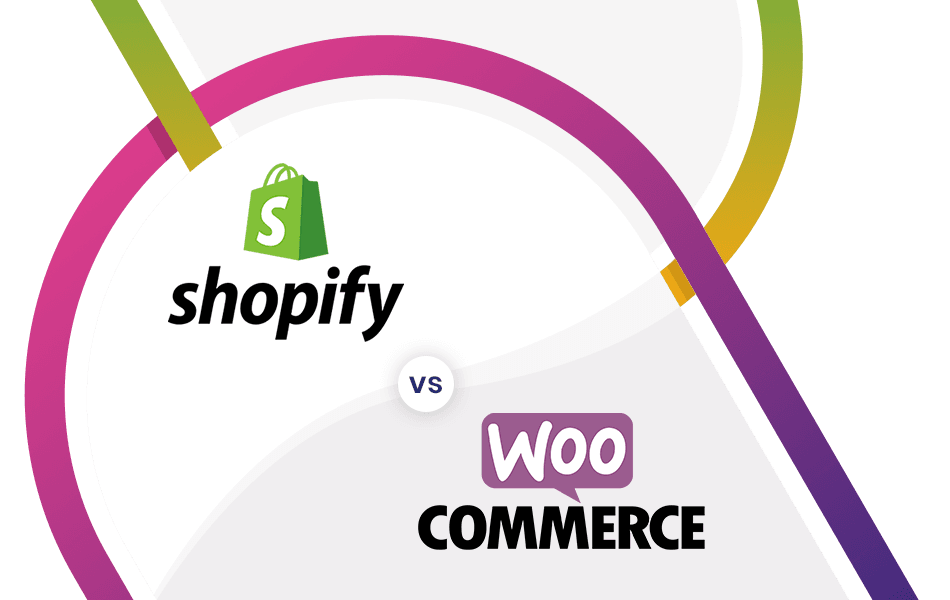
Free Digital Marketing Review
Elevate your online strategy with a personalised report and expert insights. Achieve your business goals faster!
Shopify vs WooCommerce: Which Ecommerce Platform Is Right for Your Business?
When it comes to building or growing an online store, the platform you choose sets the foundation for your entire digital presence. It impacts everything from day-to-day operations and user experience to marketing performance and long-term scalability.
For many businesses currently using legacy platforms, that foundation may already be cracking. Poor flexibility, performance issues, limited integrations and lack of control can all hold you back.
Two of the leading options we work with are Shopify and WooCommerce. Each has its strengths and trade-offs, and the right choice depends entirely on your business model, resources and goals.
Why Your Ecommerce Platform Matters More Than You Think
Switching platforms is not just a technical upgrade. It is a strategic decision that can have a ripple effect across your entire business. If your current ecommerce setup is making things more difficult, whether that is slow load times, lack of integration with your marketing tools, or over complicated stock management, it’s time to consider a more flexible and future proof solution.
Many businesses come to us feeling frustrated by the limits of legacy platforms. They want a website that performs better, more control over their online store and the ability to grow. That is where Shopify and WooCommerce come in.
Common Migration Challenges (and How to Avoid Them)
Migrating from an existing ecommerce platform to Shopify or WooCommerce can feel daunting. It involves more than just moving content — there are technical, operational and marketing considerations that need to be addressed for a successful transition.
These are some of the most common challenges that can arise during ecommerce migrations and the steps that can be taken to avoid them.
Loss of SEO Rankings
Changes to URL structure, missing redirects and broken links can affect how easily your site is found in search engines. To help maintain your visibility, it is important to map and apply 301 redirects, keep metadata in place and monitor performance after launch. These steps can help protect and potentially improve your search rankings during a website migration.
Downtime During Migration
Unexpected downtime during a website migration can impact customer experience and sales. To help avoid this, the new site should be built and tested in the background while the current site stays live. A well planned migration process helps ensure everything transitions smoothly with minimal disruption.
Data Loss or Inaccuracies
Transferring product details, customer records and order history requires careful handling. A structured approach to data migration, along with thorough quality checks, helps ensure all key information is carried over accurately and nothing is missed.
Integration Gaps
If your online store relies on third party tools such as CRMs, fulfilment software or email platforms, it is important to make sure they are fully connected to your new ecommerce platform from the start.
Shopify Overview
Shopify is a fully hosted ecommerce solution. It was designed with ease of use in mind, making it ideal for business owners who want to get up and running quickly without dealing with the technical aspects of hosting and website maintenance.
Key Advantages of Shopify
1. Fully Managed Infrastructure
Shopify is a fully hosted platform, which means that all server maintenance, hosting, security and updates are handled for you. This allows you to focus entirely on your products, customers and marketing strategy without worrying about the backend.
2. Built-in Ecommerce Tools
From product listings and payment gateways to analytics and inventory tracking, Shopify provides a full suite of ecommerce features out of the box. Everything you need to run your store is already built in and seamlessly integrated.
3. Reliable Performance at Scale
Shopify handles high volumes of traffic with ease. The platform is designed to scale automatically as your store grows, and it maintains fast load times even during peak shopping periods. This reliability is especially important if you run seasonal campaigns or flash sales.
4. User-Friendly Admin Interface
Shopify’s back-end dashboard is clean, intuitive and easy to use, even for those with little technical experience. You can manage products, track orders, view customer data and monitor your sales performance from one central location.
Potential Drawbacks of Shopify
1. Limited URL Structure Customisation
Shopify’s fixed URL structure includes default elements like “/collections” for product categories. While this is not a dealbreaker for most businesses, it can impact on Shopify SEO performance if you are migrating from a platform with a different URL structure.
2. Restrictions on Custom Development
Shopify is more limited when it comes to custom functionality. While you can tweak themes and use custom apps, full control over the platform’s code is not available in the same way it is with open-source platforms. This can be a challenge for businesses that need a highly bespoke solution.
3. Additional Transaction Fees
Unless you use Shopify Payments (their in-house payment gateway), Shopify charges additional transaction fees on top of your standard payment provider charges. These fees can add up over time, especially if you are processing high order volumes through third-party gateways.
WooCommerce Overview
WooCommerce is an open-source ecommerce plugin designed for WordPress. It transforms any WordPress website into a fully functioning online store and offers unrivalled flexibility for businesses that want full control over their site’s design and functionality.
Key Advantages of WooCommerce
1. Total Customisation and Control
WooCommerce gives you complete ownership of your website. You can fully customise both the front end and the back end, allowing you to create a completely tailored customer experience. If you can imagine it, you can build it.
2. No Additional Transaction Fees
Unlike Shopify, WooCommerce does not charge any transaction fees beyond those set by your chosen payment gateway. This makes it a more cost-effective choice for businesses that process a high volume of sales.
3. Powerful SEO Capabilities
Since WooCommerce is built on WordPress, it inherits all the SEO advantages that come with the platform. With the right plugins and strategy, you can take full control of how your site appears in search engines and drives significant organic traffic to your store.
4. Scalable and Extendable
As an open-source platform, WooCommerce allows for virtually unlimited scalability. Whether you need advanced integrations, unique customer journeys or complex business logic, WooCommerce can accommodate it, if you have the right technical resources.
Potential Drawbacks of WooCommerce
1. Requires Ongoing Maintenance
WooCommerce does not take care of hosting, security or updates on your behalf. You are responsible for tasks like plugin updates, theme maintenance, backups and hosting management. Many businesses choose to manage these in-house or work with a trusted provider to ensure their site stays secure, stable and up to date.
2. Plugin Compatibility Challenges
With thousands of plugins available, compatibility issues can arise. Not every plugin works seamlessly with others, and updates can sometimes introduce conflicts that need to be resolved manually. A robust testing and maintenance process is essential. Side by Side Comparison: Shopify vs WooCommerce
Side by Side Comparison: Shopify vs WooCommerce

When to Choose Shopify
Shopify is a great choice if you are looking for a reliable, no fuss ecommerce solution that allows you to launch quickly and scale easily. It is particularly well suited to:
- Businesses without in-house technical support
- Companies that want a hands-off approach to maintenance
- Stores that need a stable, hosted solution with strong ecommerce functionality built in
- Brands running seasonal campaigns or handling high traffic periods
For businesses looking to prioritise marketing, sales and growth while minimising technical management, Shopify can be a suitable option.
When to Choose WooCommerce
WooCommerce is ideal for businesses that need complete control over their website and have either internal developers or a digital agency to support them. It is best suited to:
- Businesses that want a highly customised customer journey or checkout flow
- Stores with complex or unique product offerings
- Companies that prioritise SEO and want full control over metadata, site structure and performance
- Brands looking to reduce long-term costs and avoid additional platform fees
If flexibility and ownership are key to your growth strategy, WooCommerce is a powerful, future proof option.
Future Proofing Your Ecommerce Growth
Choosing the right platform is only the beginning. To achieve long term success, your ecommerce site must be able to grow and evolve with your business.
Here’s how each platform supports that journey:
With Shopify:
- You can easily add new sales channels like Amazon, eBay, Instagram or TikTok
- Shopify’s app ecosystem allows you to extend functionality without coding
- The platform handles hosting upgrades automatically as you grow
With WooCommerce:
- You can build entirely bespoke features to support new business models
- Open-source flexibility means no limits on future integrations or redesigns
- You retain full ownership of your website and data as your needs evolve
Our Recommendation
Choosing the right ecommerce platform depends on a range of factors, including your business goals, available resources, team structure and technical preferences. There is no one size fits all solution, and the best platform for you, whether Shopify or WooCommerce, often comes down to one key question:
Do you want simplicity or flexibility?
- If you need a quick, robust solution with minimal overhead, Shopify may be the way forward.
- If you need long-term control and deep customisation, WooCommerce may be better aligned with your ambitions.
Let’s Plan Your Next Move
Choosing between Shopify and WooCommerce is not just about features on a checklist. It is about finding a platform that supports your long-term growth and aligns with how your business operates.
If you are still deciding which direction to take or preparing to migrate, getting the right guidance early on can make all the difference. Taking the time to plan your ecommerce strategy now helps set your online business up for lasting success.

Need help with your website and marketing?
Book a FREE growth strategy session with our experts
Our award-winning team will review your website and marketing goals to provide you with crucial insight and advice.

4.9 STAR
Google reviews
With 10+ years of experience, Link Digital has helped hundreds of businesses to succeed online. We can help yours too!

